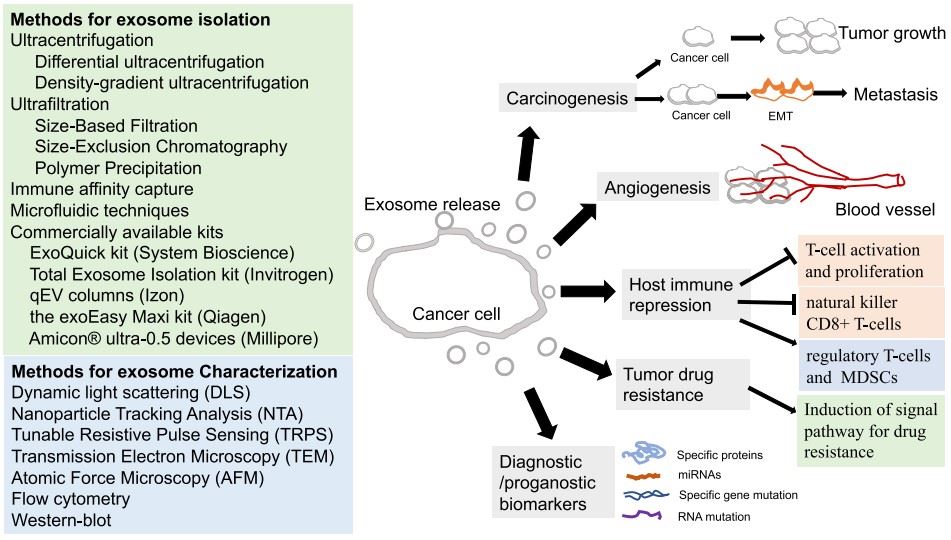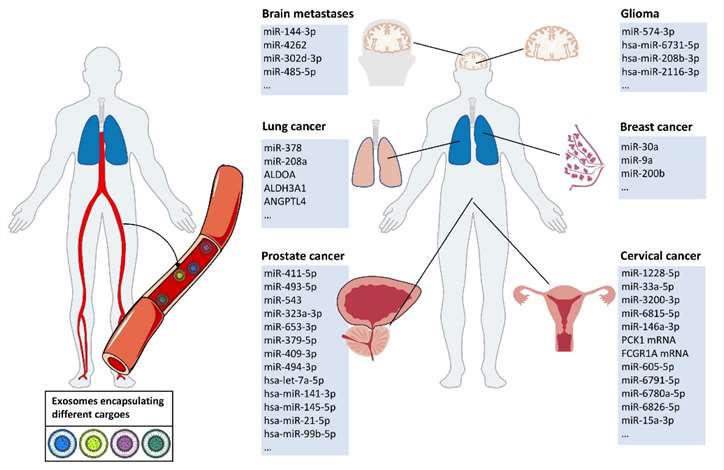Tumor Prognosis Prediction-Applied Exosomes
Exosomes are vesicle-like bodies that are actively secreted by a variety of living cells and are rich in various biologically active substances. These inclusions can indicate the physiological condition of the donor cells and are gradually used in the diagnosis and treatment of diseases. Tumor-derived exosomes (TExos) play important roles in many aspects of cancer, including tumor-associated immune regulation, microenvironment remodeling, angiogenesis, invasion, and distant metastasis. A large number of studies have shown that there are often significant differences in the expression profiles of TExos contents in different cancer stages, indicating that these contents are closely related to the occurrence and development of cancer. Therefore, TExos content is considered as a promising liquid biomarker for tumor prognosis assessment, which helps doctors to evaluate the treatment efficacy and survival time of tumor patients. Creative Biolabs can provide the most comprehensive sequencing services to help customers discover promising exosomal markers for tumor prognosis assessment.
 Fig.1 Exosome isolation, characterization, and tumor-derived exosomes role in tumor development.1,3
Fig.1 Exosome isolation, characterization, and tumor-derived exosomes role in tumor development.1,3
Significantly Differential Contents in Exosomes Derived from Body Fluids of Cancer Patients
TExos widely exists in body fluids, and the detection of TExos content has the advantages of non-invasiveness, simple operation, reproducibility, and more tumor information. A study involving 285 nonsmall-cell lung cancer (NSCLC) patients found that the preoperative plasma exosomal microRNA-451a level in the recurrence group was 2.89 times that of the non-relapse group. Moreover, exosomal miR-451a was closely associated with lymph node invasion, vascular invasion, and pathological stage. These data suggest that exosomal miR-451a levels have an independent prognostic value for overall survival (OS) and disease-free survival (DFS) in NSCLC patients. In addition, exosomes can be used in liquid biopsies after cancer radiotherapy. Analysis of exosome cargo in the body fluids of tumor patients before and after radiotherapy can help predict the radiotherapy efficacy and prognosis of patients, which in turn helps to optimize tumor treatment options.
 Fig.2 After tumor radiotherapy, exosomal cargoes in the body fluids of tumor patients are altered.2,3
Fig.2 After tumor radiotherapy, exosomal cargoes in the body fluids of tumor patients are altered.2,3
In short, various molecules in TExos have shown good diagnostic performance in the diagnosis of tumors and cancers, can effectively predict tumor recurrence and treatment response, and help clinicians choose individualized treatment options. Although tissue biopsy remains the gold standard for tumor diagnosis, it is invasive and limited by tissue samples. Therefore, obtaining TExos as a minimally invasive method can reflect the overall molecular information of the tumor and can be repeatedly sampled for large-scale monitoring. TExos has significant advantages in liquid biopsy for tumor prognosis.
Creative Biolabs Features
Creative Biolabs is a leading provider of exosome discovery services. Please feel free to contact us with your ideas. Our most professional team will provide you with a full set of exosome marker discovery services.
References
-
Li, MY.; et al. Progress on pivotal role and application of exosome in lung cancer carcinogenesis, diagnosis, therapy and prognosis. Molecular Cancer. 2021, 20(1):22.
-
Shi, Y.; et al. Exosomes in Liquid Biopsy: A Nanotool for Postradiotherapy Cancer Monitoring. Frontiers in Bioscience-Landmark. 2022, 27(7):205.
-
under Open Access license CC BY 4.0, without modification.
For Research Use Only. Cannot be used by patients.
Related Services:

 Fig.1 Exosome isolation, characterization, and tumor-derived exosomes role in tumor development.1,3
Fig.1 Exosome isolation, characterization, and tumor-derived exosomes role in tumor development.1,3
 Fig.2 After tumor radiotherapy, exosomal cargoes in the body fluids of tumor patients are altered.2,3
Fig.2 After tumor radiotherapy, exosomal cargoes in the body fluids of tumor patients are altered.2,3









